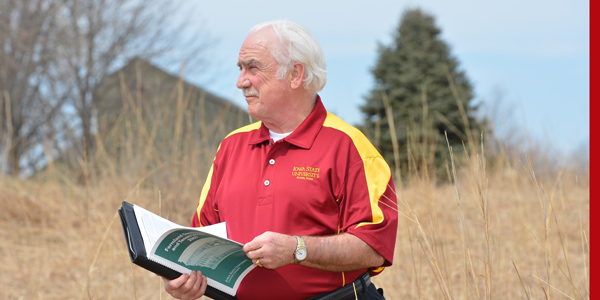
Sharing The Economics Of Hope: Legendary Careers Spans Farm Crisis To Historic Land Value Highs
The world’s most productive land rests in Iowa, and extension economist Mike Duffy is known as the voice of expertise who relates its worth.
Through his trademark annual Land Value Survey, Duffy shares results and analysis with media ranging from the New York Times to readers of Wallace’s Farmer. After 25 years, Duffy’s thoughtful delivery is so intertwined with the information itself it’s hard to imagine one without the other.
Duffy says not a day passes when there isn’t an email or a phone call to answer. But the delivery of anything he shares, he says, is much more than just reporting results.
“I know and understand the information that I work with and try to answer people’s questions—all over the board,” says Duffy. “I try to be moderate and work hard to give people as much information as I can so they can form their own opinions.”
But it’s not just the Land Value Survey he’s responsible for compiling and communicating to the general public, there are also surveys on land ownership, cost of production and land sales data.
And as the former associate director of the Leopold Center, the chair of the sustainable agriculture program, the former director of the Beginning Farmers Center, or in his current work on soil conservation, there’s a distinct message around conservation and sustainable agricultural practices that he’s well known for.
As he contemplates retirement, Duffy reflects on the fact that he is so closely connected to the information he shares.
“Probably the biggest thing in my whole career has been to learn how to balance societal perspective with individual perspective.”
Economics of hope
Duffy honed his balancing skills in his first position with Iowa State University as an extension farm management field specialist in Cedar Rapids, counseling farmers on their financial options during the farm crisis in the 1980s.
“For seven days a week I was dealing with people in crisis. There were suicides and even some murders because of the stress. It was a traumatic time, and my role was to deal with people, offer information and to help them to have hope, he says. “Those years had a strong influence on me.”
Duffy arrived at ISU’s Department of Economics in 1985, starting as an assistant professor and receiving full tenure by 1992. His research interests have focused on conservation, sustainability, small scale farm practices and an appeal to a more cautionary approach in the use of technology in agriculture.
In an era where technology-driven ag production practices are the predominant approach, he admits some of his views have had a “built-in potential for conflict.”
Yet rather than “draw lines in the sand,” Duffy is more interested in finding ways to help people meet in the middle.
Seeing both sides of the Fence
He expresses concern about the polarization of views in agriculture today—a polarization he sees as preventing problem solving on critical issues that affect the future of farming, no matter what side of the fence.
He points to the ongoing problem of topsoil erosion and the imminent need to improve conservation. “Farmers are only trying to make a living, whether or not they’re using good soil conservation practices. No one goes out and says, ‘how much soil can I destroy today?’” he says. Yet he knows valuable topsoil will be lost forever without active conservation.
Duffy and a team through the Iowa Learning Farm recently were able to show that erosion results in a loss of revenue for the farmer. He hopes the presentation of information that relates to everyone’s bottom line can help farmers find middle ground.
“You certainly don’t move forward by being a Luddite,” he says. “But you also don’t move forward without examining things carefully.
“I try to empower people to see other points of view rather than just harden into one position—I think the future of conservation depends on our willingness to walk a mile in each other’s moccasins.”
Paul Lasley, chair of the Department of Sociology at Iowa State University, agrees Duffy is “really more interested in building bridges” than towing a hard line. The two have worked with each other closely off and on since the mid-1980s on issues around farm policy, rural development and natural resources, and share a similar background in the use of surveys to convey information to the public.
“Over the years Mike has fostered what I would call a participatory approach,” says Lasley. “He’s come to realize that when you hold your own views too strongly, people don’t talk. So he offers information in ways that help people solve problems.”
“No matter what side of an issue you’re on, ultimately, people not only hear him, but respect him for his wisdom, knowledge and the years of service he’s given to the public,” Lasley says.
Online Extra: Check our Mike Duffy’s land valuation study, including a video press conference on the latest results.



